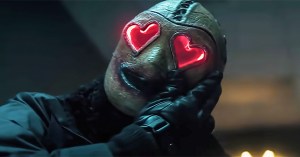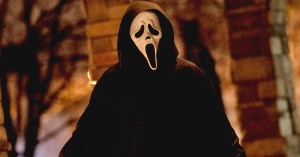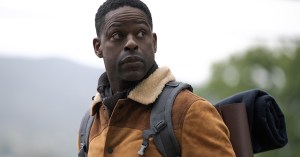RT on DVD & Blu-Ray: Sherlock Holmes: A Game of Shadows
Plus, a few bombs, an Oscar nominee, and some solid Criterions.
This week on home video, we’ve got action, we’ve got comedy, we’ve got drama, and we’ve got suspense. On top of that, we’ve got three older films with bright, shiny Criterion makeovers that should make fans of those movies dribble at the mouth just a little bit. See below for the full list!
Sherlock Holmes: A Game of Shadows
60%Sir Arthur Conan Doyle’s iconic detective has inspired several iterations on both television and the big screen, and when Guy Ritchie (Snatch) unleashed his version of the character upon the world in 2009, starring a suitably neurotic Robert Downey Jr. in the title role, he scored a hit. 2011 featured the follow-up, Sherlock Holmes: A Game of Shadows, in which Holmes finally faces off against his legendary arch-nemesis, Professor Moriarty (Jared Harris), who Holmes believes has orchestrated the apparent suicide of the Crown Prince of Austria. RDJ displayed great chemistry with his Dr. Watson, Jude Law, in the first film, and the critics felt they were just as good here, but they also didn’t think the second story quite measured up to the first. At 61%, A Game of Shadows should still make for an entertaining rental.
Ghost Rider: Spirit of Vengeance
18%In this sequel to the widely panned 2007 film Ghost Rider, Nicolas Cage once again dons the leather jacket and fiery skull to play the Marvel anti-hero. After having defeated the son of the Devil, Johnny Blaze (Cage) is hiding out in Europe, afraid the dark power within him may be too destructive. When a priest (Idris Elba) comes calling to ask Johnny for help rescuing a unique boy and his mother from the Devil’s mercenaries, Johnny agrees, but only if the priest will exorcise “The Rider” from within him. Directorial duties for Spirit of Vengeance went to the team of Mark Neveldine and Brian Taylor (Crank, Jonah Hex), and they succeeded in earning an even lower Tomatometer score than the first film (18% vs. Ghost Rider‘s 26%). We’ll just leave it at that.
Tyler Perry’s Good Deeds
37%No one can deny that Tyler Perry is one hardworking man; unfortunately, most of his movies have been critical bombs, even as they’ve found a niche audience. All but one of his directorial efforts are Rotten, and his latest, Good Deeds, fails to beat the trend. Trading in his Madea shtick for a suit and tie, Perry here plays Wesley Deeds, a businessman with a picture-perfect life who is shaken out of his routine by a chance encounter with a single mother (Thandie Newton) on the janitorial staff of his building. The pair hit it off, and soon Deeds must decide if this is the life he was always meant to have. At 32%, Good Deeds earned some praise for Perry’s continuing growth in directorial prowess, but most critics were turned off by its tedious melodrama.
A Little Bit of Heaven
4%Kate Hudson hasn’t starred in a Fresh film since 2000’s Almost Famous, and the average Tomatometer for all of the movies she’s made since that breakout performance is right around 26%. A Little Bit of Heaven is apparently far worse than that. Hudson stars as a flighty advertising exec who finds out she’s contracted terminal colon cancer, then impresses her doctor (Gael Garcia Bernal) so much with her carefree attitude that the two end up falling in love. Packed with familiar rom-com clichés and, according to critics, more than a little disrespectful in its tone to anyone who has ever lost a loved one to cancer, A Little Bit of Heaven earned a mere 4% on the Tomatometer, the lowest of Hudson’s career. The negative reviews for this film might be more entertaining than the film itself.
In Darkness
88%If the title of this film sounds familiar, it’s probably because you watched the Oscars this year; In Darkness, representing Poland, was one of the nominees for the Academy Award for Best Foreign Film. Based on true events, it tells the story of Leopold Socha, a maintenance worker in Lvov, Poland during Nazi occupation who helped shelter a group of Jews in the sewer system below the city. While the opportunistic Socha at first takes money for his services, he soon forms a bond with the refugees that his conscience cannot ignore. Powerful and expertly crafted, In Darkness isn’t “just another Holocaust movie,” it’s an effective character piece and a harrowing survival story, and it’s Certified Fresh at 90%.
Harold and Maude – Criterion Collection
86%It’s possible to argue that the typically quirky indie comedies of today owe a debt to Hal Ashby and his 1971 film Harold and Maude. The story centers around a young man named Harold (Bud Cort) who is so obsessed with death that he drives a hearse, stages fake suicides, and attends funerals for people he doesn’t know. At one such funeral, Harold runs into Maude (Ruth Gordon), a free-spirited 79-year-old with a cheerful zest for life that equals his own morbid fascinations, and an unlikely friendship — and later, romance — blossoms. This week sees the release of a new Criterion edition of this classic dark comedy, including a new commentary track, illustrated audio excerpts from seminars by Ashby, and a new interview with songwriter Cat Stevens.
Shallow Grave – Criterion Collection
72%The second of three new Criterion releases this week, Shallow Grave marks the introduction of several talents all at once. It was the feature debut of director Danny Boyle, screenwriter John Hodge, and producer Andrew Macdonald, who would go on to work together again on films like Trainspotting and A Life Less Ordinary, both of which also starred one of Shallow Grave‘s three leads, a young and unknown Ewan McGregor. In this thriller, McGregor and co-stars Kerry Fox and Christopher Eccleston play a trio of self-absorbed yuppie flatmates seeking a fourth living companion; when their new tenant overdoses in his room with a large stash of money, the three friends decide to keep the money and dispose of the body, leading to unforeseen consequences. The extras here include two commentary tracks, a new interview with McGregor, Eccleston, and Fox, and a documentary on the making of the film.
The Gold Rush – Criterion Collection
98%Lastly from Criterion, we have another bona fide classic in every sense of the word. Charlie Chaplin’s The Gold Rush is one of the great silent era films we most remember him for (as was his wish), featuring Chaplin’s “Little Tramp” character as he prospects for gold in the harsh Yukon territory. The film includes some of Chaplin’s most famous gags, including the shoe-eating scene and the “Dance of the Rolls.” Criterion was kind enough to include not only the original 1925 version of the film, newly restored, but also the 1942 sound version, which includes a few edits, new music, and a narration by Chaplin himself. The extras include a new commentary by Chaplin biographer Jeffrey Vance, four trailers, and four making-of segments chronicling different aspects of the film. If the Criterion editions of Modern Times and The Great Dictator are any indication, this should be a superb pick-up for any Chaplin fan.






